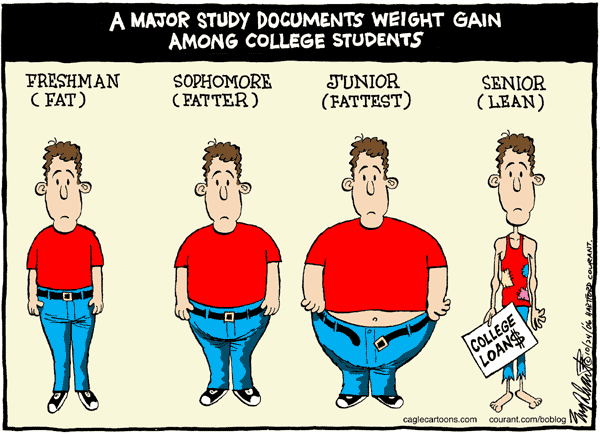Debt
According to the Wall Street Journal, not only is average debt rising, but more students are taking out loans to finance secondary education. Almost 71 percent of bachelor’s degree recipients will graduate with a student loan, compared with less than half two decades ago and about 64 percent 10 years ago (WSJ. 2015). The Institute for College Access and Success quotes, 1.3 million students graduating with debt, up from 1.1 million in 2008 and 0.9 million in 2004. Seventy-five percent of graduates from private nonprofit colleges had student loans (Debt Facts 2014). I can honestly say that getting a few scholarships has helped me out over the years, but I still do not have a sufficient amount of funds. Why is that? Because college costs have been rising over the past decade. Not only do I have to apply for subsidized loans but I also have to apply for unsubsidized ones. The amount of debt expected from me after graduation is equivalent to almost $15,000 with interest. With my current salary and economic status, 2017 is a year I am not looking forward to. Hopefully I will get another job that will help me out with savings in the meantime.
Loss of Inspiration
Only 56 percent of the students who enter America’s colleges and universities graduate within six years, while only 29 percent of students who enter two-year programs complete their degrees within three years, the study found (ThinkProgress 2012).
The freshman me was 1,000 times more eccentric and excited about school than the junior me, and to be honest this took me by a huge surprise; I thought I would be a lot more excited about my future as the years progressed in college, but instead, I’ve become increasingly more afraid. I was one of those students who really enjoyed school while growing up. I had prepared so hard to make it to a University and achieve my goals to become a computer scientist. What I failed to realize is that I would be introduced to a multitude of uninspiring, dry, unequivocally apathetic professors, advising staff and students who claimed the majors and life goals I had were going to be overshadowed by the lack of support, debt, and limited job opening. So I changed majors over and over, but I still received the same feedback, only worse. Sooner or later the courses I began taking were becoming increasingly harder -- not because they were evolving into sophomore to junior level courses, but because after constant sarcastic “good lucks” from faculty, I began to wonder if what I was doing in college was going to be worth while in the end. Now getting a degree -- the freshman me always dreamed of achieving for personal success -- is now just a piece of paper, worth over $28,000 (and unsellable) that I need for a better job.
College can be really tough for most if not all students. My only advice is to make the decision you know will benefit you the most, and hurt you the least in the long run. College life can be a gamble, so I also advise you to sit down and think hard about your future. Even if you only develop a third of a plan, you are still thinking ahead of the game.
References
Jeffery Sparshott. "Congratulations, Class of 2015. You’re the Most Indebted Ever (For Now)." WSJ. Web. 11 Mar. 2016.
The Institute for College Access & Success. 2014. Quick Facts about Student Debt.
Waldron, Travis. "Study: Nearly Half Of America’s College Students Drop Out Before Receiving A Degree." ThinkProgress RSS. 2012. Web. 11 Mar. 2016























